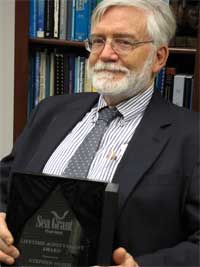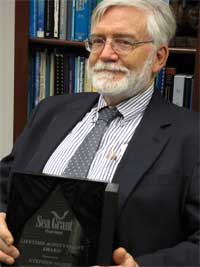 NARRAGANSETT, R.I. – February 1, 2012 – Stephen Olsen, director of the Coastal Resources Center at the University of Rhode Island’s Graduate School of Oceanography, returned from Spain last week where he accepted an award for his pioneering efforts at coastal management in Latin America. This honor follows on the heels of a lifetime achievement award he received last month from Rhode Island Sea Grant for similar efforts in Rhode Island.
NARRAGANSETT, R.I. – February 1, 2012 – Stephen Olsen, director of the Coastal Resources Center at the University of Rhode Island’s Graduate School of Oceanography, returned from Spain last week where he accepted an award for his pioneering efforts at coastal management in Latin America. This honor follows on the heels of a lifetime achievement award he received last month from Rhode Island Sea Grant for similar efforts in Rhode Island.
“Coastal management is really about social justice,” Olsen said. “It’s about how natural resources and access to those resources get allocated. It’s about how to institute a stewardship ethic and not just rape, pillage and plunder our coastlines.”
Olsen joined the Coastal Resources Center in 1972 to help Rhode Island’s newly formed Coastal Resources Management Council develop policies and plans for managing the state’s coastlines. He became the Center’s director in 1975. The initial plan became one of the first approved by the federal government, and a revised plan adopted in 1985 remains in force today.
“That second plan may be my biggest achievement because it forced us to go through the state and federal approval process again and rethink it to make sure it would function effectively,” he said. “It included a scheme for zoning the waters of the state, and on the basis of that, controlling the degree of development that occurs along the shoreline. That proved to be a successful strategy, and it’s the reason why our coastline looks very much the same today as it did 30 years ago.”
Olsen led the team that prepared a special area management plan (SAMP) for Rhode Island’s salt ponds, an early expression of the ecosystem approach to the management of lagoons (salt ponds) and their watersheds that resulted in the development of collaborative management agreements by the Coastal Council, towns and several government agencies. That success, and special area management plans for six other parts of the state, led to last year’s Ocean SAMP, the first federally approved marine spatial plan.
“Here in Rhode Island, Olsen has pioneered the development of the state’s coastal program, which has resulted in systemic changes in the way the state has managed and regulated its rivers, lagoons, and especially Narragansett Bay. No other individual or organization has had such a broad and sustained track record in this field,” said Barry Costa-Pierce, Rhode Island Sea Grant director, in presenting Olsen with the lifetime achievement award.
When the U.S. Agency for International Development saw that the problems occurring along coastlines around the world were similar to those being addressed in the United States, it turned to Olsen to transfer what had been learned to developing countries. An initial four-year coastal management program Olsen led in Ecuador, Sri Lanka and Thailand was renewed for 10 years and was followed by a 10-year effort in Mexico, Indonesia and Tanzania. The Coastal Resources Center has received more than $75 million in USAID funding for these and other projects.
The award Olsen received in Spain recognized him and a Brazilian colleague as having had the greatest influence on the practice of coastal management in Latin America and the Iberian peninsula. The honor was bestowed at a symposium hosted by Ibermar, the leading coastal management organization in Spain.
Olsen, who also serves as president of EcoCostas, a non-governmental organization he formed in Ecuador in 1995, said that while the coastal issues are similar from country to country, the context in which those issues play out differ radically.
“In much of Latin America, coastal people are living in great poverty, the institutions of government often don’t work, and the goods and services flowing from healthy coastal ecosystems are rapidly being depleted,” Olsen said. “It is much the same in Africa and, to a lesser degree, here in the U.S.
“My main message is that the practice of coastal management is above all a social process, which is quite different from those who say that it is the business of government or only concerns the application of science to the problem,” he added.

